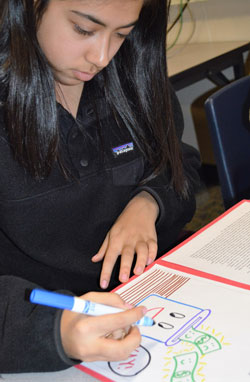Pedro Garcia said his parents have taught him that money itself is neutral; it’s how you get it and what you spend it on that matters.

“I was raised in a culture of respect, hard work and honesty,” said the Northern High School junior. A native of Mexico, Pedro said he grew up washing cars, selling fruit and doing magic tricks to earn money to buy video games. And now that he’s saving for college, he expects to work hard to pay for that.
“I see money as opportunity,” he said. “I do understand how people can see it as a bad thing, but I see it as a neutral element; you can turn it into anything you want. It really depends on your personal values.”
Senior Nadia Groce admits she’s “very impulsive with the money I spend, like on eating out instead of making food at home.” She sees money as female, a sort of ghost-like spirit that hovers over everything. “I see it as a little manipulative, but quiet about it,” Nadia said.
Nearly 100 students in business teacher Brian Johnson’s personal finance class — mostly seniors — are taking an in-depth look at money this semester. As part of that, they are examining how they view money so far.
The goal, Johnson said, was to bring a literary component to the course, which previously was taught solely using a financial education workbook by talk radio’s Dave Ramsey.

During the first semester, the book “The Money Savvy Student” by Adam Carroll was added. For this semester, Johnson was awarded a grant from the Forest Hills Public Schools Foundation to purchase copies of “Loaded: Money, Psychology, and How to Get Ahead without Leaving Your Values” by behavioral economist Sarah Newcomb.
Johnson has been teaching personal finance for about a decade. He admitted that adding the literary and artistic components to the class “was way out of my comfort zone.”
“I always used to focus on the math and financial concepts,” he said. “After reading through the kids’ papers, it’s very clear that there is an emotional aspect to how we relate with money.”
Many of the students “really opened up in their narratives and shared very personal stories … too personal to display publicly,” Johnson said. “It is clear that they are already battling with knowing that saving is a good thing while wanting to spend freely, even if that spending is beyond their limits.”











